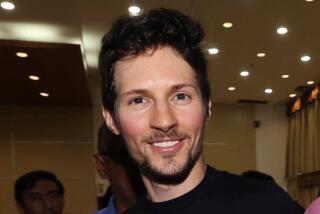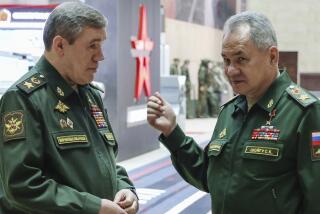Russian Oil Tycoon Khodorkovsky Arrested
- Share via
MOSCOW — Special forces swooped in on Russia’s richest man Saturday when his plane stopped for refueling in Siberia, then handed him over to prosecutors who charged him with seven criminal counts, including tax evasion and fraud.
The action against Yukos Oil Co. Chief Executive Mikhail Khodorkovsky -- which a company spokesman said resembled the capture of a terrorist -- stunningly raised the stakes in a months-long confrontation between prosecutors and the influential billionaire, a battle many see as a struggle over political power and oil riches rather than real issues of law.
At its broadest level, the struggle pits pro-business bureaucrats headed by Prime Minister Mikhail M. Kasyanov against officials who want to rein in the country’s wealthiest men -- the so-called oligarchs who acquired much of the nation’s wealth in controversial 1990s privatization deals.
Many in the anti-oligarch faction come from state security services and are associated with President Vladimir V. Putin, a former KGB lieutenant colonel. But the president, who is expected to seek reelection in March, has not publicly taken sides.
“I would expect an outburst of conflict between those two groups after this arrest,” said Sergei Markov, a prominent political analyst. “It is a big political fight, and there certainly are some political forces that might protect Khodorkovsky. Those political forces don’t want law enforcement and security structures to have the major political influence in our country.”
Yukos spokesman Alexander Shadrin said his boss was detained when his plane landed before dawn at Novosibirsk on its way to Irkutsk.
The plane was surrounded by trucks with their lights on, then two buses drove up and armed men rushed into the plane shouting: “FSB! Weapons on the floor or we’ll shoot!” Shadrin told reporters. The FSB, or Federal Security Service, is the domestic successor to the Soviet KGB. When one of the officers told Khodorkovsky to go with them, the Yukos chief replied, “OK, let’s go,” Shadrin said.
Khodorkovsky, 40, was brought back to Moscow, questioned by prosecutors, then taken before a court that approved his formal arrest and ordered him to be kept in custody, at least temporarily. He was then taken to Moscow’s Matrosskaya Tishina prison.
“This was all political,” Anton Drel, his lawyer, told reporters. “He asked me to make it clear that he has no regrets over what he has done, no regrets over not leaving the country.” Khodorkovsky had earlier described the legal attacks on Yukos as political and said he would prefer imprisonment to exile.
Khodorkovsky was accused of individual tax evasion, and at the corporate level was charged with large-scale theft by fraud, damage to the property of others through fraud and corporate tax evasion.
He is also accused of forgery of official documents, embezzlement and failure to observe a court ruling. The corporate tax evasion charges total $556 million, and the individual tax evasion charges are for $1.7 million, the Russian news agency Itar-Tass reported.
Forbes magazine this year estimated his net worth at $8 billion.
Yukos issued a statement criticizing “the brutal coercion used against the head of one of the largest oil companies of the world.”
“Expressing confidence in the final victory of justice, the Yukos Oil Co. has no doubt about the obviously political motivation of the investigation,” it said, adding that the arrest “will not seriously affect its business.”
As Russia heads toward parliamentary elections in December and presidential balloting in March, many voters look favorably on prosecutors’ recent actions against the oligarchs led by Khodorkovsky, who became rich under former President Boris N. Yeltsin. Platon Lebedev, a billionaire Yukos shareholder, has been imprisoned since July on fraud charges relating to a 1994 privatization deal. Alexei Pichugin, head of a security department at Yukos, also is behind bars.
Critics see the legal attacks on Khodorkovsky and his associates as a form of selective enforcement of the law: a politically motivated effort to keep him out of politics and put wealth into the hands of people, many with connections to the security services, who have risen to power under Putin.
Critics also fear that the attacks on Khodorkovsky and his business empire -- generally viewed as one of the more open, accountable and Western-style firms in Russia -- raise broader questions about private property rights and the safety of foreign investments in the country.
“If Khodorkovsky is convicted, it is unlikely that he would keep his shares,” said Markov, the analyst, who is chairman of the National Civic Council on International Affairs, a Moscow think tank. He predicted that “all those oligarchs who played a significant role during the Yeltsin period will be punished now.”
It is likely that Khodorkovsky committed at least some of the crimes of which he is accused, but “the problem is that the majority of oligarchs committed similar violations,” Markov said.
“From this point of view, it is possible to say that we have an example of a selective use of our legislation. At the same time, thanks to our laws, it is really hard to run a business in our country without violations.”
The legal attacks on Khodorkovsky and his firm began after he started donating money to opposition parties that will compete against pro-Putin forces in December parliamentary elections. Khodorkovsky also has been mentioned as a possible 2008 presidential candidate, although many dismiss that as unrealistic given public antipathy toward the oligarchs. In any case, many analysts have viewed Yukos’ legal troubles as a warning to him to stay out of politics.
Anatoly Chubais, a former top Yeltsin-era official who played a key role in privatization and is now a prominent businessman, told reporters Saturday after an emergency meeting of the Russian Union of Industrialists and Entrepreneurs that Putin must take a stance.
“Russian business believes that the law enforcement system and its leaders have worsened the situation in society and undermined entrepreneurs’ trust in them,” Chubais said. “Only Russian President Vladimir Putin’s clear and unambiguous position can stop these developments. The absence of such a position will trigger irrevocable consequences that may result in a sharp deterioration in the business climate and a lack of investment appeal in Russia for foreign partners.”
*
Yakov Ryzhak of The Times’ Moscow Bureau contributed to this report.
More to Read
Sign up for Essential California
The most important California stories and recommendations in your inbox every morning.
You may occasionally receive promotional content from the Los Angeles Times.













